Subscribe Apple | Google | Spotify | Stitcher | iHeart Living the Dream Overseas with Christine Gritmon Have you had a lifelong dream to live overseas and haven't made that happen yet? Maybe things have gotten in the way like family, jobs, life. My...
Ep152 Transcript: Interview with Jolene Park
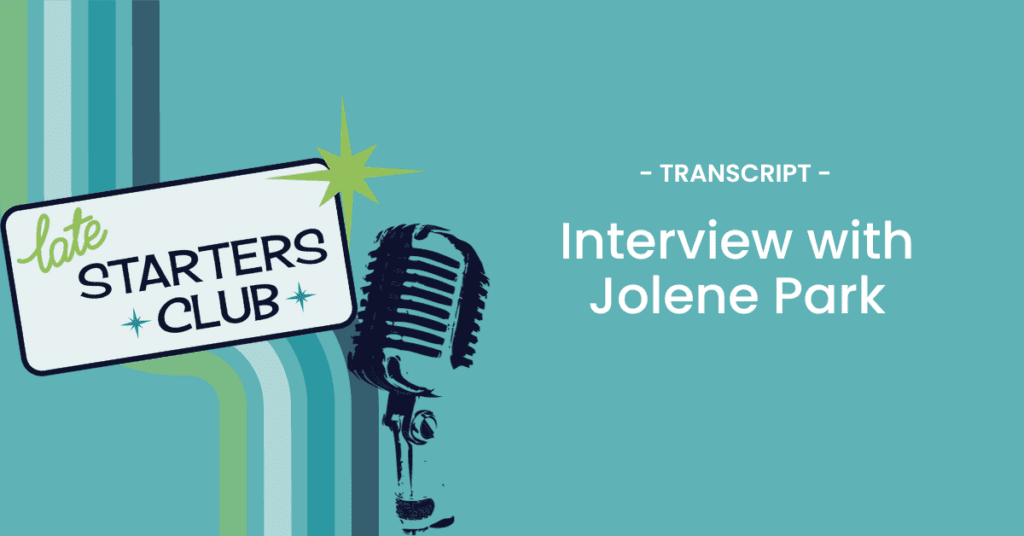
Andrea Vahl: Oftentimes, a big change in our own journey can inspire a brand new career in midlife. That’s exactly what happened with my guest today. Jolene Park, who was a nutritionist who pivoted into an expert in the gray area of drinking through her own journey. Tune in and get inspired.
Intro: Hello, dreamers. Welcome to the late starters club, giving you the inspiration, mindset, and tools you need to start something midlife and beyond remember, it’s never too late to follow your dreams.
Andrea Vahl: Hello, late starters. It’s your host, Andrea Vahl. And today, I am joined by a friend of mine that I knew when she lived back here in Denver. Now she’s moved. And so it’s super fun to catch up. My friend, Jolene Park.
Jolene Park: Hey Andrea, so glad to be with you.
Andrea Vahl: Yeah. Great to be with you. And so for those of you who are not familiar with Jolene’s work, she is a sought after speaker and a leading authority on the gray area of drinking gray area drinking.
And she had a Ted talk that has been viewed 400,000 times. Amazing. She’s a functional nutritionist and health coach, and she has developed lots of different programs to help replenish repair the nervous system after quitting drinking. So we’re going to dive into all of that. It’s so many interesting ways and avenues for this interview to go.
So I’m super excited and hopefully we’ll be able to contain it within our half hour timeframe.
Jolene Park: Yeah. Let’s jump in. Like you said, so many ways to go, especially just with gray area drinking.
Andrea Vahl: Yeah. The reason I had you on here is, you’ve had your business for a long time.
You were saying like 20 plus years, right?
Jolene Park: Yeah. I started as an entrepreneur in, Oh gosh, I don’t know the year. It was my early thirties and I’m now in my early fifties. So…
Andrea Vahl: And what happened was you pivoted into this new space, this gray area drinking space in your early forties, I think it was early forties?
Yeah. And just launched this new segment of your business. And just ran with it. And now that is really most of what you do, right?
Jolene Park: It is. It was really very organic and unplanned. There was no strategic business plan behind it. I did not wake up thinking this was a business. One morning I’m like, Oh, now this is what I’m going to try.
It really just started because of my personal experience and my personal story of quitting drinking and no one was more surprised than myself that then that was a business.
Andrea Vahl: So let’s dive into that a little bit and how that started. So you were, working as a nutritionist, you were in corporate spaces, but also with your own business, but what prompted this shift and what, how did this come about?
Jolene Park: Like I said, I stopped drinking in 2014. And. I don’t have a dark story. I don’t have a rock bottom story. My story would not make a good drinking memoir. It wouldn’t make a good Hollywood movie. I just decided on my own I didn’t want to drink anymore.
I had many back and forth times over the years.
And what I mean by that is I would, I’d stopped times as working in wellness, as a nutritionist, I would do wellness challenges, nutrition challenges, and I’d stop drinking under that umbrella. It wasn’t hard for me to stop drinking. What was hard was “Well, I don’t need to be so restrictive. I don’t need to be, this doesn’t need to be forever. This black and white feels, really heavy. I can be a social drinker, you know, I can have a glass of wine with friends.” So I’d go back to drinking. So that’s what I mean by that back and forth.
And I did that many times over the years. And then I get to, you know, go back to drinking the way I was drinking, which was a glass of wine. I’ll have another glass of wine. I’ll have another glass. Easy often to drink the bottle of wine, polish it off on my own and nothing bad happened. I didn’t get a DUI. I didn’t lose work or relationships, but a bottle of wine by myself frequently. I felt awful the next day and I would hide that.
But it was just, that was just internally. It’s like, I don’t want to keep doing this groundhoging at 43 years old. And I just looked down for the next decade trajectory. And I thought nothing has happened, but there was this knowing I am rolling the dice a bit here I don’t want something to happen.
And so I just made the decision to stop drinking and I used what I knew with my work and functional nutrition and wellness and did a lot of just regulating my own blood sugar and nervous system and we can talk about some of those things.
And about a year into not drinking I started speaking about. It started just quickly. I went on a podcast where they were talking about, stopping drinking, but it wasn’t the traditional way where the hosts of the podcasts were going to a 12 step meeting. And I didn’t do that either. And I enjoyed listening to their podcast and I emailed and said, I love these conversations of just this different reframe around stopping that hasn’t been that traditional 12 step rock bottom approach that I identify with, but I stopped.
But I said, but I feel like there’s this missing piece that you’re not talking about. And that’s the physiological piece. And so they asked me to come on. And that’s then what created this whole business that I didn’t know I was going to be creating. And I talked about the physiology, the brain chemistry, the craving brain behind alcohol, behind sugar.
And a lot of then what I just kn ew to do because of the work I was doing for myself. And I started talking about that. So many women in kind of the 35 to 55 year age group stepped forward and emailed me and said, your story is my story. Like I was fine. I don’t have a rock bottom, but I drink in a very similar way.
I know it’s not good for me. I don’t want to keep drinking like this. And this whole new business for me was born in my mid forties.
Andrea Vahl: That’s amazing. That’s amazing. And it’s interesting, that you just follow the curiosity with Oh, talk about it.
And then the support and the people come out of the woodwork to show you Hey, this is actually a thing, so that’s really great. And I like how you were talking about, and you just mentioned this to the fact that it is a problem for especially women, right?
You were saying, especially women in this age range. And I think people don’t think about that. They think, Oh, you know, you party in college and now you have it managed.
Are there any statistics on, how many people are doing this kind of thing a lot or what?
I don’t know if there’s…
Jolene Park: Yeah, absolutely. The statistics are interesting. In that I think the percentage is 86 percent that women have, drinking in women over the last 15 years has increased 83, 86%. And, so basically women are drinking in a way right now in history that they’ve never drank before.
So that mommy juice culture, that playdates and, wine and book clubs. And I think sex in the city popularized this a bit, the fancy cosmos out with the girlfriends. So, you know, and I see it, I mean, my mother didn’t drink the way I did.
My parents weren’t big drinkers. I mean, they would have a glass of wine at dinner and things out with friends, but the way I was going out with girlfriends in my late thirties, early forties and drinking, having a glass of wine and another glass. And so it’s, and again, not that women didn’t drink in the seventies but there’s really been this uptick in the last decade, 15 years.
Of increase of drinking with women, men have held steady, but women there there’s really a notable jump and then COVID didn’t help. So it’s with COVID about just men and women, there was really then an increase with drinking too. And in the gray area. The definition with that is people don’t need to go away to treatment and they don’t need to remove themselves from their physical environment to stop drinking.
They don’t need medical intervention, to, for seizures and those kinds of things, no shame on that. No shame at all. It’s just. Like the work that I do. I’m not trained in that physiological support. People are, drinking at that level. The people I work with is they don’t need that physiological support, but they’re also not drinking every now and again.
Meaning couple times a year, maybe a couple times a month, and so most people don’t drink in those two extremes where they need medical intervention or they’re just drinking every now and again. Most people drink between those two extremes and it’s a gray area and some and all kinds of labels. Some people will identify as a social drinker, a moderate drinker, a problem drinker and alcoholic.
All of that can be under the gray area. If they don’t need medical intervention or they’re not every now and again, people will claim different labels, but it’s all under this one big umbrella of it’s gray because there is no safe or healthy recommended intake level of alcohol. And that came out in 2018 and the Lancet and the cancer studies, they say there’s just.
Preventing cancer, disease prevention. There is no recommended safe intake level of alcohol. I’m not saying people shouldn’t drink. But it’s just for that kind of that spectrum. That’s where that gray area definition starts to come into play.
Andrea Vahl: So it’s not like you can say I have X number of drinks per week, so I’m fine.
Jolene Park: There is actually now it’s just coming around. So have you heard of Andrew Huberman, the Huberman podcast? He’s great. Highly recommend. And those of your listeners who love physiology and just health and brain science, he’s a neuroscientist at Stanford. He’s a really popular podcast right now.
He just goes into all of this stuff about everything about sleep and all the things. He did a podcast last year on alcohol. And he named it. He drew the line in the sand and he said no more than two drinks a week for men and women. So it’s three or more drinks a week. Its on the spectrum.
And that’s probably going to, we’re probably going to see that follow in 2025 with government guidelines. I think they’re actually going to draw that line in the sand. And that’s been a problem because in the past, we haven’t had. It’s always been ambiguous. Like we’ve danced around that.
Nobody’s really named a number, but it’s coming and that it doesn’t take much to be on the spectrum. However, people want to label themselves. And again, people can be social drinkers and not at all have a problem. But as far as like the line in the sand for safe. Disease prevention, optimal health, it is no more than two or two or more drinks a week.
Andrea Vahl: Interesting. That’s good. Oh, that’s good to know. Cause I think that people don’t always, know that, we compare ourselves. We hear about the French who have a glass of wine with dinner every night and it’s okay, and it must be, I know it’s challenging, especially as um, you know, like, It’s very much a social situation.
It’s a definitely a challenge when, you’re out socially, what’s everyone doing? It’s the center of attention a lot of times, so it is…
Jolene Park: The biggest thing I work with clients on with my private coaching. Is that exact piece of my industry, my work environment, my family, my neighborhood, the city I live in.
It’s just a, it’s a drinking culture. Everyone around me drinks. How am I going to go into this weekend or this evening and not have a drink? And that’s the top thing I work with clients on.
Andrea Vahl: So let’s talk a little bit about the challenges in pivoting to this brand new thing you would, you’d already been doing your business.
So you’re familiar with running a business. What were some of the challenge and challenges and obstacles you ran into with pivoting into this whole new, a whole new space, this whole new business model?
Jolene Park: So taking things online. So I went online before COVID it was 2016 when I really went online and was doing the one on one coaching and started to put my programs out.
So just learning that dynamic and learning the video side of things, like I was Skyping with clients before zoom. I was just doing, video calls video meetings. And just learning the technology really was a huge piece. And then, you know, I was still um, entrepreneur in person and working with groups. So then pivoting more to working with individuals and really honing. I’ve done some, coaching with some doctors, but it wasn’t, I mean, all of a sudden coaching one on one really became my primary piece. So I think it was just. Those pieces were in place, but it was just emphasizing them.
They all, all of a sudden different pieces became more of the focal kind of dominant part of my business and then learning all those pieces to manage them.
Andrea Vahl: Yeah. Yeah. Yeah. That’s, it’s a lot. It’s a lot. And I think as entrepreneurs, we don’t start out to be. We don’t start out thinking, Hey, I want to really dive into technology.
I want to really fight with all the different things that have to talk to each other and figure out how to, email and whatever from different addresses, all this stuff. So it’s crazy. So awesome. Well, that’s, and that’s great that you work through all that.
And then let’s talk a little bit about the The Ted talk and how that came about and just how that has helped you and your business and what that’s done for you.
Jolene Park: So I did the Ted talk in Denver in Lakewood when I was still living there I always, cause I, as a speaker and corporate trainer, I’d always wanted to do a Ted talk. It was on, on the bucket list as I always wanted to write a book too. I’m still working on that, but I just submitted an application in 2017.
I’d been working in public with some podcasts and, online with the gray area conversation for a good year and a half and I submitted the application and they chose me. And I had about two months to, you know, I kind of put my big idea down, but I didn’t have the speech or anything.
So it was two months of living, breathing, eating, sleeping, trying to figure out, the Ted talk and memorizing and writing and rewriting and practicing. So it was like none other. It’s not like facilitating a workshop. It’s not like keynoting. It’s not like doing this, online.
B ut it was a great, ultimately it was a great experience. Yeah.
Andrea Vahl: And then have you had people who have found you through that? Has that been a helpful in terms of your business or was it just, something that’s been exciting to, to do and have on the list?
Jolene Park: It’s been so helpful for my business.
It really, it put this pioneering message on the global stage. This is, it’s still, there’s, it’s still a bit taboo. It’s changed a lot. It just, in the last five years more and more people are hearing this, but there’s still a lot that haven’t heard the term gray area drinking. And the Ted talk, it really put it on the national stage. I train other coaches from other countries also in the U S a lot of them. Really learned about me at that point. Media has contacted me because of the Ted talk. Clients have definitely found me and hired me because of the Ted talk. So business wise it has been, very beneficial.
Andrea Vahl: Yeah. That’s awesome. That’s great to know and super cool , cause you’ve been interviewed on NPR and other media sites and things like that.
Jolene Park: I have.
Yeah. And again, really the national media has, contacted me because of that TED Talk so. It’s been very, very helpful. And then I’ve had my own podcast talking about gray area drinking and been interviewed many times. So to me it’s a way, like having a book, I mean, I still need to write the book, but it certainly gives that stamp of visibility the way a book does and credibility.
Andrea Vahl: That’s very cool. So then, so you’ve got your courses and then you also do the train, kind of train the trainer type is what you’re, yeah. So you’re helping train is it other nutritionists that are out
Jolene Park: there who are…?
I train any certified or licensed health practitioner who’s working one on one with clients.
So I’ve trained nutritionist, health coaches, medical doctors, pharmacists, social workers, therapists. And so across the holistic and traditional board, my training is, my, my. marketing phrase, but very true is that if you’re working with clients or patients, you’re working with gray area drinkers.
And so I just feel like the real missing piece that this training and education needs to get into more practitioners hands. And that’s really my mission and passion right now.
Andrea Vahl: That’s awesome. That’s awesome. And then is there a reason it’s like health practitioners? Is there a lot of you, obviously from your background, you probably approach it from a little bit of a physiology kind of space, but what, is there a reason you’re focused mostly on healthcare practitioners?
Jolene Park: Yeah, it’s such a good question. What I’ve found in the trenches, working one on one with gray area drinking clients for seven years And being, active on social media and posting about this topic is over and over I hear from clients and people will comment on posts saying, I wish my doctor or my therapist or my personal trainer, whoever would have said.
You’re drinking too much. and there’s a bit of a misnomer out there that people will say, Oh, people lie on intake forms about how much they’re drinking and the level of the amounts and all that, what I’ve found actually working with people, having thousands of conversations is people are often quite forthcoming with their practitioner. I was, I called my nurse practitioner and I said, my anxiety is up. I’m drinking more than I know I should be. And the first response to me was, you know, the connection between alcohol and breast cancer, don’t you? And I didn’t at the time.
But many, many people will report. Saying I, I brought it up with my therapist or, my doctor and they just quickly brushed it off and they’re like, Oh, it’s not like you’re an alcoholic or anything. You’ve just been under a little stress. Let’s just up your antidepressant. So often, because we’re so used to in healthcare it’s that extreme thing, you’re not sitting on a park bench, you’re not, you don’t have jaundice because you’re damaging your liver. So you’re fine. But with gray area drinkers, it becomes very confusing because they know internally, it’s just that silent kind of fretting, worrying, thinking about it, googling, maybe reading some, memoirs about alcohol, and then when they bring it up and somebody’s like an authority, a health practitioner is ah, don’t worry.
Many people then go on to continue to drink for, many years, like another decade. And then they’ll say, I wish when I, we had that conversation 10 years ago, my doctor, therapist, coach would have just said, it’s too much alcohol. And I, you know, and I can tell you working with people one on one people don’t get offended.
People want that outside, like. this is too much. And again, talked about earlier, like it doesn’t take much to be too much. But really, it’s not about this quantitative Oh, you’ve crossed the mark. It’s this. Is there an internal conversation going on where you’re fretting, worrying, saying, Oh, I can’t keep, I don’t want to have it on the night like this.
I didn’t intend. I was just going to have a drink. And so it’s more, that’s the qualifier and people know, and often they’ll bring it up a bit in conversation. And with a practitioner. And so my intention is, yeah. Everyone doesn’t need to sit down and do full on gray area, drinking, coaching, whether they’re a nurse or a therapist or whatever, but just to be trained on the, what this is and they’re really great statistics and research and moving in into the neurobiology, the neuroscience, the physiology of supporting clients again, they don’t need to do it, but just knowing there’s a lot of resources.
You know, My resource hub is one, but there’s many out there because the conversation has really evolved. And just there’s a gray area before you hit that real rock bottom, there’s also, this whole resource kind of opportunity when you stop drinking in the gray area of what then that looks like, because gray area drinkers.
Often don’t go to 12 step meetings often, they don’t go to rehab, but they need support. And so then that’s what I do and the practitioners need to know about what that support and resources are. .
Andrea Vahl: Yeah. Yeah. That’s great. I, that makes perfect sense on choosing thoughtfully who you’re going to.
I’m praying to get the word out a little bit more since that’s a natural conversation people are having. So that’s great.
Jolene Park: If it’s on the intake form, which it is, practitioners who put that on their intake form need to know how then to have more of a conversation. And I also say too, if you’re working with anyone in any realm, physically or emotionally, We have to ask the alcohol conversation because it impacts so much physically and emotionally and to just have that elephant in the room and not address it, it’s, you can be spinning in some circles, whatever you’re doing, it doesn’t matter what you’re doing physically or emotionally.
You’ve got to ask how much alcohol is involved here because it can certainly impact whatever you’re trying to work with, with your client.
Andrea Vahl: Yeah. Yeah. Yeah, that’s, that, that’s huge. It’s such a huge conversation And so do you find that there is some pushback from people? Are they like, do people get upset with Hey, you’re telling me not to drink at all or something, you know, is there, is there a lot of pushback that you’ve had to deal with?
And. In this new field, you’ve been, in now,
Jolene Park: so there’s enough people out there in the gray area who silently are like, Oh, I didn’t know this conversation was happening. You’re talking to me like this. I want to know more. There’s enough. I’m not plucking people off the street saying “you’re drinking too much!” There are enough that are.
So everyone voluntarily steps in and says, I want to hear more. I want to know more. This is your, you’re speaking to me like, it’s always my story. Again, we don’t have to I’m not out pointing fingers. I’m very, I’m not a prohibitionist. I’m not, I mean, people are always going to drink.
It’s not a judgment about if you’re having that internal struggle, but functioning really well. My clients have incredible career resumes, incredible life resumes. Some of the job titles, some people I’ve worked with very impressive and they’re like, I function, nobody, no.
I’m like, I know that’s all part of it. So no it’s not because this isn’t like a dare.
Andrea Vahl: Right. It’s not an intervention.
Jolene Park: Nobody out there should drink, right? That’s not my message or my work. My, what I’m giving voice to is those who are questioning yet often people around them are like, Oh, you’re just worried too much.
Everything in moderation, stop that just to know. There is a whole global community. There are really amazing resources. And the resources I work with is all physiology. So I’m not doing cognitive therapy. I don’t want to be a therapist. I work physiologically. Let’s look at the blood sugar, let’s look at cortisol, the microbiome, that connection with the gut and the brain.
My whole TED talk is on neurotransmitters. And my, my audience, the demographic, the people I’m working with and who are drawn into this are, they’re already often really into wellness doing all the things, but also drinking too much. And that was, that was me. I was teaching wellness. And so it’s that missing piece of Oh, there’s this physiology.
It’s not a character defect. It’s not a self will run riot or, the psychological deficiency. It’s a physiological, like if we’ve got low GABA, the anti anxiety natural chemical, we’re going to reach to a chemical outside of us for that initial kind of GABA piece. And so that’s my work and that’s what people are.
And so people are either drawn to that. They’re like, this just makes so much sense. I’m identifying with, how you drank. And I’m so into these physiological pieces, they step in. And there’s enough of a demographic out there. to come forward. There’s job security with this out, going out and pointing the fingers.
So people want to drink, people drink. It’s not what I’m preaching against. My mission is not to get the whole world to stop drinking, but my mission is for those who are struggling quietly with that gray area drinking.
Andrea Vahl: Yeah. Yeah. That makes so much sense. And yeah. So like you said, you’ve got a large demographic available to you, but it is, I think that makes sense.
It’s the people who are raising their own hands and saying, I, this isn’t right for me anymore, or whatever. Awesome. Awesome. And yeah, so this is, I feel like I could talk forever, like about this whole thing, but the good thing is you guys, if you are interested in learning more about this, about diving in more, Jolene has tons of resources on her website.
We’ll have links to that in the show. Show notes, but it’s gray area drinkers. com is a place where there’s a lot of information about programs, resources. Her Ted talk is there. We’ll also link to all of that. But I do want to just, I love to have each one of my guests come in and share a favorite inspirational quote or motivational saying that keeps them going.
Cause I’m such a quote junkie. So I’d love to have you share yours.
Jolene Park: So we talked about this, but I want to share I can’t do two. So I want to share from a coach that I had a couple of years ago that, that really was the catalyst for helping me move here to Charleston and I’ll share hers first and then I’ll share a more well known author.
This, it’s such a great reflection that I go back to at least once a year, sometimes a couple of times a year, but her question to me was. What are and I was just turning 50 at this point, she said, what are you not doing that you want to be doing? And that question. Moved me across the country, moved my business, moved everything.
So I just want to, I would just hit me now, even though we talked about it before.
Andrea Vahl: Yeah, no, I love that. I love that. It’s such a great thing to ask yourself at least once a year, right?
Jolene Park: Yeah. Just that reflection and reevaluation. And again, that’s, that’s so much of my work is the somatic kind of that embodied, working with the body, nervous system, the body first, then up to the mind. And so it’s part of the somatic body work is tracking and asking, what’s the next, the body knows . And if we’re really off course and really trying to just numb and escape and drown with alcohol, like what are we not doing that we really want to be doing. So that was a really helpful piece.
And then the other quote from Anis Nin. I always have a hard time with her name, but I’ve always liked this. And sometimes I post it at least like once a year on Instagram, but her quote is, and the day came when the risk to remain tight in a bed was more painful than the risk to blossom and to bloom.
Andrea Vahl: Yeah, I love that one too. It’s so, It’s so great. It’s such a great reminder about risk too, because we do think that it’s, we have this thing about safety and it. It is a risk to remain where you’re at. And it’s, we don’t think about that risk rather than going towards the bigger thing.
So that’s, that is awesome. Awesome. Jolene, this has been so fun. It’s been so fun to, to chat again. It’s been so long since I’ve seen you, obviously since before COVID, but I wasn’t even going to as many, we met at a networking event and I wasn’t even going to as many networking events later.
Right before COVID. So good to catch up with you again. I’m so excited for this important work that you are doing because just educating people around this. And we all know in the back of our minds, all the dangers of too much alcohol, but it’s great to have that open up a conversation about it and just really realize, Hey, let me examine.
What I’m doing right now. So thank you.
Jolene Park: You’re welcome. And that’s what it’s all about. It’s just examining if you’re drinking right now and just having a little reflection about that and then you choose. It’s yeah.
Andrea Vahl: Yeah. Awesome. Thank you everyone. We’ll have all the links in the show notes and and thanks. Thanks for listening.
Outro: Hope that was helpful and make sure you grab the free guide top tools for late starters on the website at late starters club. com and let’s turn dreaming into doing.
Join the conversation.
Let us know what you think about this episode.
Never miss an episode.
Subscribe to the podcast
You may also enjoy…
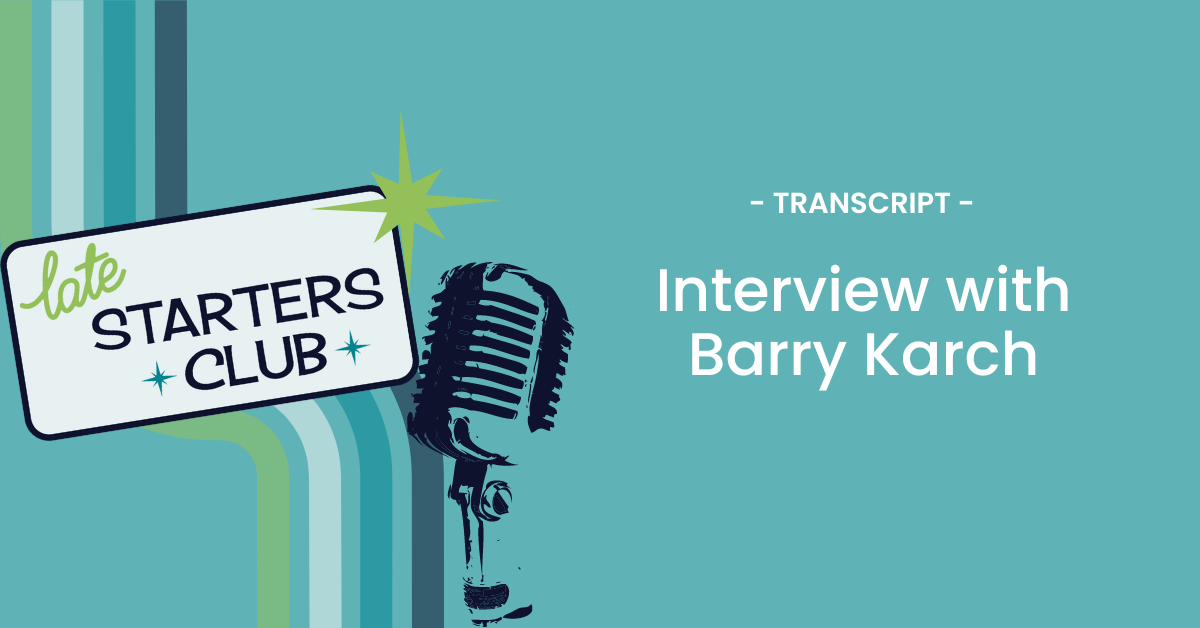
Ep170 Transcript: Finding New Motivation with Barry Karch
Finding New Motivation with Barry Karch Andrea Vahl: It's never too late to restart something you loved. My guest today, Barry Karch, started training for a marathon after a 20 year hiatus. And we'll also dive into how he climbed the equivalent of Mount Everest...
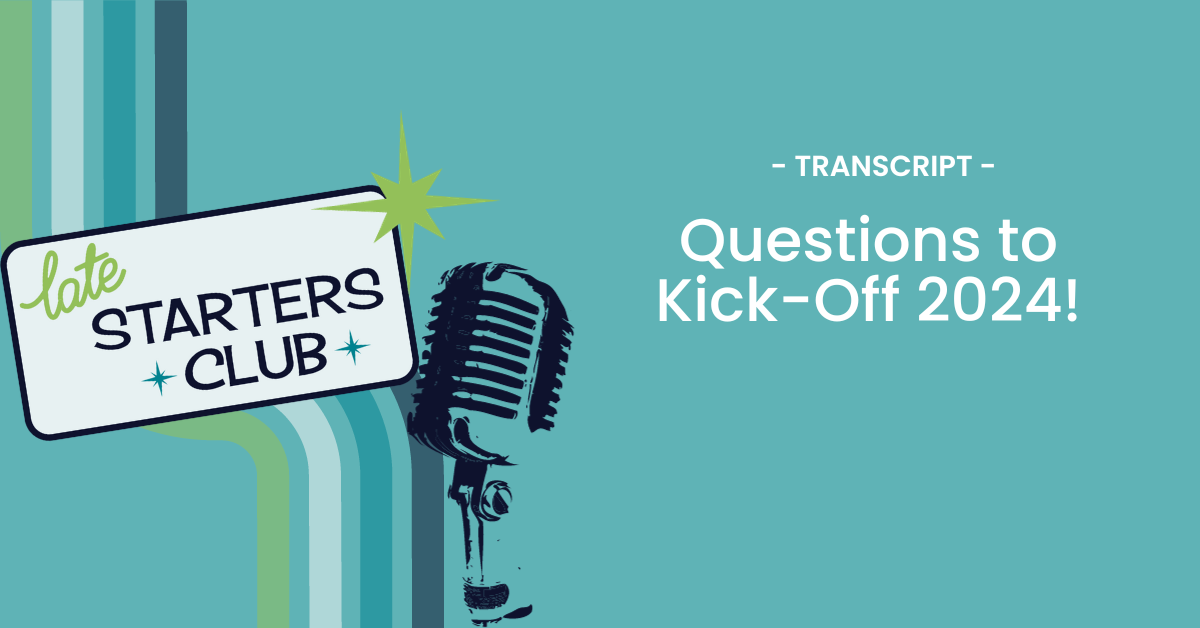
Ep169 Transcript: Questions to Kick Start 2024
Andrea Vahl: Oh, happy new year. Yeehaw. 2024. All right. I don't know about you, but I love planning out my year and setting goals and really reflecting on how my past year went and being super intentional about what I want the next year to look like. In today's...
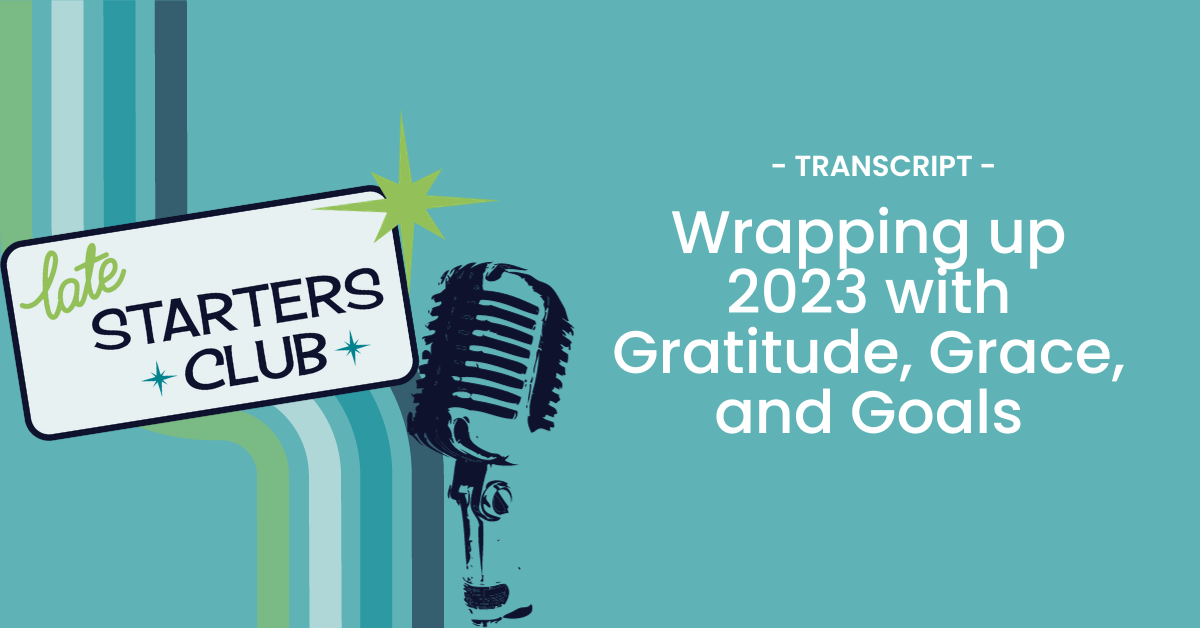
Ep168 Transcript: Wrapping up 2023 with Gratitude, Grace, and Goals
Hello, late starters. It's your host, Andrea Vahl And today is Christmas day. And if you do celebrate that Merry Christmas, if you celebrate some other holiday, I wish you all the best and all the joy for that. I just wanted to make a different episode. So today we're...
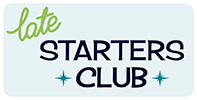
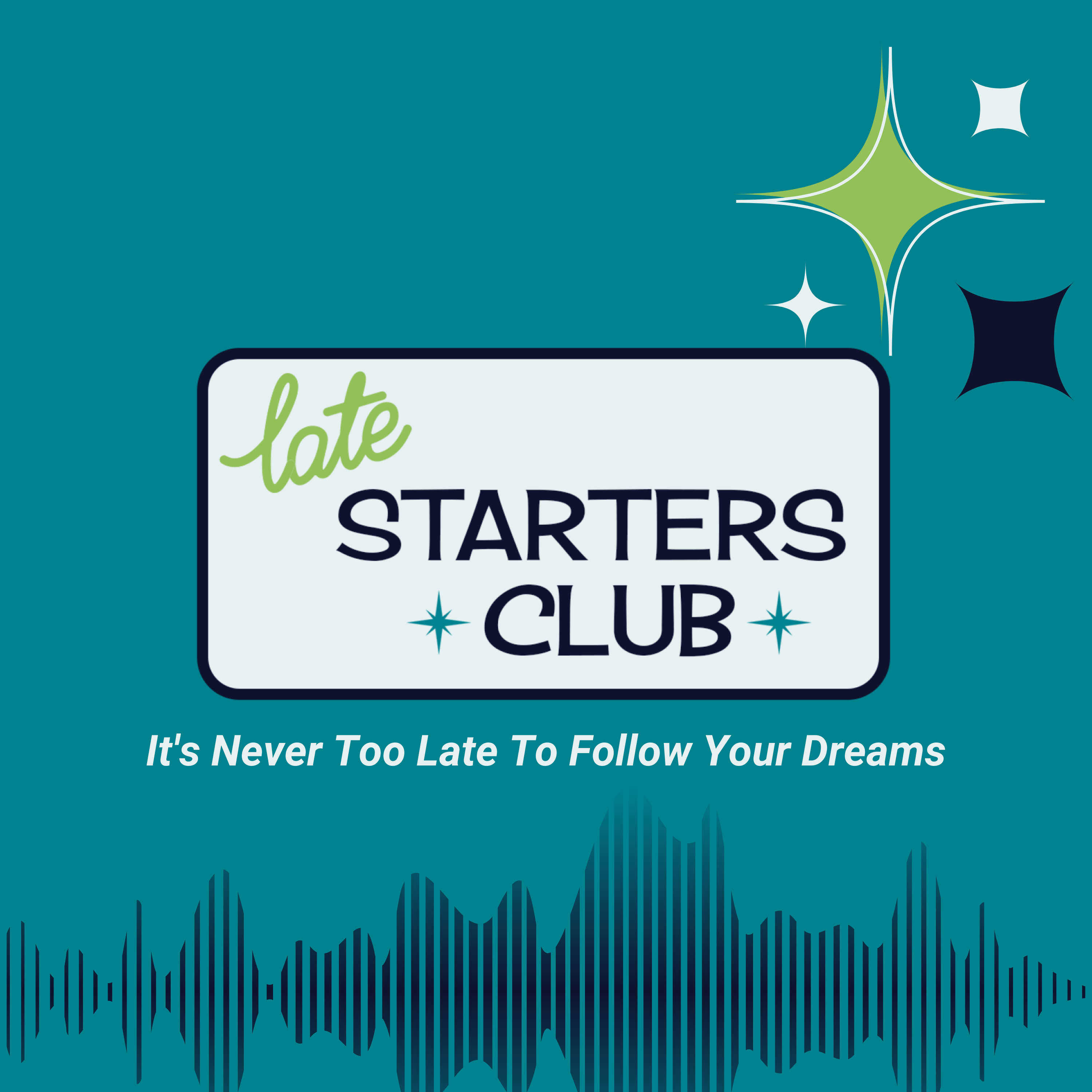
0 Comments